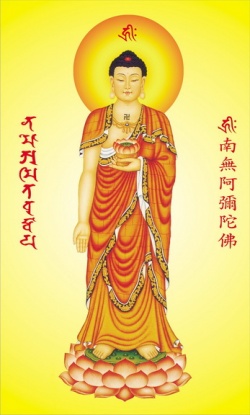Difference between revisions of "Amitabha names in various languages"
| (3 intermediate revisions by the same user not shown) | |||
| Line 1: | Line 1: | ||
[[File:Am ddha.jpg|thumb|250px|]] | [[File:Am ddha.jpg|thumb|250px|]] | ||
| − | The proper (nominative) [[Form]] of [[Amitabha]]'s name in [[Sanskrit]] is '''[[Amitabha]]'''. This name is a compound of the [[Sanskrit]] words '''amita''' meaning "without bound, infinite" and '''abha''' meaning "[[Light]], splendor". Consequently the name is to be interpreted as "he who possesses [[Light]] without bound, he whose [[Light]] is infinite". Another name that is used is ''Amitayus'' (nominative [[Form]] '''Amitayuḥ'''). This name is a compound of '''amita''' "infinite" and '''ayus''' "[[Life]]", and so means "he whose [[Life]] is boundless". In Chinese [[Language]] Chinese [[Amitabha]]'s name is given as 阿彌陀佛 ''Āmítuó Fó'', where 阿彌陀 Āmítuó is the Chinese representation of the first three syllables of either [[Amitabha]] ''or'' Amitayus, and 佛 Fó is Chinese for [[Buddha]] (a very early borrowing of the first syllable of the [[Sanskrit]] word). The ''meaning'' of [[Amitabha]]'s name is given in Chinese as 無�?光佛 Wuliangguang Fo ("infinite [[Light]] [[Buddha]]"), and likewise the meaning of the name Amitayus is given as 無�?壽佛 Wuliangshou Fo ("infinite [[Life]] [[Buddha]]"). These names are not, however, very commonly used. Vietnamese [[Language]] Vietnamese, Korean [[Language]] Korean, and Japanese [[Language]] Japanese use the same Chinese characters for the name of [[Amitabha]], but pronounce them slightly differently: | + | |
| + | |||
| + | |||
| + | |||
| + | |||
| + | |||
| + | |||
| + | |||
| + | |||
| + | |||
| + | |||
| + | |||
| + | |||
| + | |||
| + | |||
| + | |||
| + | |||
| + | |||
| + | |||
| + | The proper ({{Wiki|nominative}}) [[Form]] of [[Amitabha]]'s [[name]] in [[Sanskrit]] is '''[[Amitabha]]'''. This [[name]] is a [[compound]] of the [[Sanskrit]] words '''[[amita]]''' [[meaning]] "without [[bound]], [[infinite]]" and '''[[abha]]''' [[meaning]] "[[Light]], splendor". Consequently the [[name]] is to be interpreted as "he who possesses [[Light]] without [[bound]], he whose [[Light]] is [[infinite]]". Another [[name]] that is used is ''[[Amitayus]]'' ({{Wiki|nominative}} [[Form]] '''Amitayuḥ'''). This [[name]] is a [[compound]] of '''[[amita]]''' "[[infinite]]" and '''[[ayus]]''' "[[Life]]", and so means "he whose [[Life]] is [[boundless]]". In {{Wiki|Chinese}} [[Language]] {{Wiki|Chinese}} | ||
| + | |||
| + | |||
| + | [[Amitabha]]'s [[name]] is given as [[阿彌陀佛]] ''[[Āmítuó Fó]]'', where [[阿彌陀]] [[Āmítuó]] is the {{Wiki|Chinese}} [[representation]] of the first three {{Wiki|syllables}} of either [[Amitabha]] ''or'' [[Amitayus]], and [[佛]] Fó is {{Wiki|Chinese}} for [[Buddha]] (a very early borrowing of the first {{Wiki|syllable}} of the [[Sanskrit]] [[word]]). The ''[[meaning]]'' of [[Amitabha]]'s [[name]] is given in {{Wiki|Chinese}} as 無�?光佛 [[Wuliangguang]] Fo ("[[infinite]] [[Light]] [[Buddha]]"), and likewise the [[meaning]] of the [[name]] [[Amitayus]] is given as 無�?壽佛 [[Wuliangshou]] Fo ("[[infinite]] [[Life]] [[Buddha]]"). These names are not, however, very commonly used. [[Vietnamese]] [[Language]] | ||
| + | |||
| + | |||
| + | [[Vietnamese]], [[Korean]] [[Language]] [[Korean]], and {{Wiki|Japanese}} [[Language]] {{Wiki|Japanese}} use the same {{Wiki|Chinese}} characters for the [[name]] of [[Amitabha]], but pronounce them slightly differently: ''[[Amida]] [[Nyorai]]'', [[meaning]] "[[Amitabha]] the [[Tathagata]] [[Tathagata]]". In [[Tibetan]] [[Language]] [[Tibetan]], [[Amitabha]] is called '' '[[od.dpag.med]]'' and, as [[Amitayus]], ''[[tshe.dpag.med]]''. | ||
| + | |||
| + | |||
{{R}} | {{R}} | ||
[http://www.mauspfeil.net/suche.html?key=Amitabha www.mauspfeil.net] | [http://www.mauspfeil.net/suche.html?key=Amitabha www.mauspfeil.net] | ||
[[Category:Buddhist Terms]] | [[Category:Buddhist Terms]] | ||
[[Category:Amitabha]] | [[Category:Amitabha]] | ||
Latest revision as of 14:01, 2 April 2024
The proper (nominative) Form of Amitabha's name in Sanskrit is Amitabha. This name is a compound of the Sanskrit words amita meaning "without bound, infinite" and abha meaning "Light, splendor". Consequently the name is to be interpreted as "he who possesses Light without bound, he whose Light is infinite". Another name that is used is Amitayus (nominative Form Amitayuḥ). This name is a compound of amita "infinite" and ayus "Life", and so means "he whose Life is boundless". In Chinese Language Chinese
Amitabha's name is given as 阿彌陀佛 Āmítuó Fó, where 阿彌陀 Āmítuó is the Chinese representation of the first three syllables of either Amitabha or Amitayus, and 佛 Fó is Chinese for Buddha (a very early borrowing of the first syllable of the Sanskrit word). The meaning of Amitabha's name is given in Chinese as 無�?光佛 Wuliangguang Fo ("infinite Light Buddha"), and likewise the meaning of the name Amitayus is given as 無�?壽佛 Wuliangshou Fo ("infinite Life Buddha"). These names are not, however, very commonly used. Vietnamese Language
Vietnamese, Korean Language Korean, and Japanese Language Japanese use the same Chinese characters for the name of Amitabha, but pronounce them slightly differently: Amida Nyorai, meaning "Amitabha the Tathagata Tathagata". In Tibetan Language Tibetan, Amitabha is called 'od.dpag.med and, as Amitayus, tshe.dpag.med.
